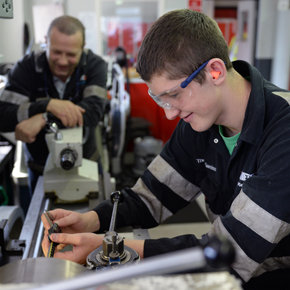
What opportunities are there for young people in construction?
Earlier in January, we told you about how schools and colleges are failing to effectively promote the opportunities for young people in construction. We know that there are apprenticeships, but what other ways are there to start a career in construction? And more importantly, are young people actually taking the opportunities available?
Apprenticeships
Apprenticeships are designed for people aged 16-24. An apprenticeship allows you to learn practical skills whilst working towards a qualification – the best of both worlds.
As an apprentice, you are employed full-time at a construction company so you also earn money whilst you learn, albeit not a lot as the current apprentice wage is £3.40 an hour.
When you have completed an apprenticeship, you will have an NVQ qualification. NVQs start at level one, and if you wish, you can work towards a Site Manager NVQ (level five) after you have completed your apprenticeship.
NVQs are assessed in several ways; usually an observer will come out to assess you at work. You can search for apprenticeships in your area here.
Traineeships
Traineeships are the step before apprenticeships and they are designed for people who have less work experience or academic skills, but want to go into an apprenticeship in future.
Traineeships can last for either a few weeks or a few months, and you will gain work experience whilst getting support with your English and Maths skills. To apply for a traineeship, you must be between the ages of 16-24, unemployed with not a lot of work experience and qualified below Level Three.
Traineeships can be found on the Government website or you can apply directly to the company that you are interested in working for. Traineeships are unpaid and focus on building employability skills.
CSCS card
When you work towards an NVQ, you will be able to apply for a Construction Skills Certification Scheme card (CSCS).
This is physical proof that you have the right skills and training for the role that you are in and there are different cards for every level of your career, from trainee to apprentice, manager to academically qualified. You can find out more information here.
Work experience
If you’re not comfortable in doing a full traineeship or you can’t find any in your area, the best thing to do is seek work experience.
Work experience usually comes from shadowing an experienced tradesperson or helping out a construction company in their office. It’s beneficial as it can help you decide whether a career in construction is right for you.
Some work experience opportunities may be presented to you through school/college, but the majority of the time you’ll need to seek them out yourself – try searching on Google for local companies and sending a polite email.
University
If you have dreams of going to university but you still want to work in construction, you can!
There are plenty of construction-related degrees out there such as Quantity Surveying, Building Surveying, Engineering, Project Management, and Construction Management.
A great way to get some work experience whilst you are studying for your degree is to embark on a sandwich course – you take a year or six months in between your years of study to work full-time on a placement in the construction industry. You will be paid as an employee and learn valuable skills ready for life post-university.
Graduate schemes
Graduate schemes make an ideal first job out of university. You will get a job in the industry and over a set period of time (usually 1-2 years), the employer will nurture you to develop your career and assist in the transition from full-time education to full-time employment.
If you didn’t do a construction-related degree, a graduate scheme is a good way to get into the industry. For instance, if you studied marketing and you are interested in working in construction, a graduate scheme could help you become a marketing executive for a construction company.
The statistics
Now that we have examined the opportunities available for young people, let’s consider whether they are actually taking them up.
Research has found that the construction industry is growing rapidly thanks to a heavy investment in infrastructure and growth in the private housing sector.
As a result, over 200,000 jobs in the industry are set to be created – so the work is clearly out there. However, beneath this positive news lies a shocking fact – young people are just not taking the opportunities presented to them.
In 2013, just 7280 construction apprenticeships were completed – a big difference between that figure and the number of jobs that are set to be created in the near future. In that same year, Government statistics showed that just under one million young people were not employed, or in education/training.
With clearly ample opportunities to work in construction, why are young people not grasping them? Some construction companies are blaming a lack of promotion for the vocational route into the industry.
Schools and colleges push the further education route, as it looks better for them if a higher proportion of students continue with their education. The fault doesn’t just lie there though, as research has shown that in 2015, just 10% of people employed in construction were between the ages of 19-24 which should be the prime age for apprenticeships.
A lot of construction companies are concerned that employing 16-18 year olds could push up their insurance premiums, so they try to avoid it, which is bad news for young people who are uninterested in taking the further education route into construction.
The Chartered Institute of Building believes that apprenticeships are the key to closing the current skills gap in construction. Apprenticeships allow young people to gain practical and academic skills which are invaluable in their career, and invaluable to employers.
However, the CIOB found that of the 32 biggest construction contractors in the UK, only 12 were taking on apprentices. Work needs to be done to encourage construction companies to employ young people.
What can the construction industry do to improve?
There are several things that the construction industry can do to improve the opportunities for young people in the future:
- Offer entry level jobs that pay well and include training/development.
- Offer a variety of roles for young people at various stages of life, such as work shadowing, traineeships, apprenticeships and graduate schemes.
- Remember that the back-of-house side (i.e. marketing, management and IT) is just as important, so offer digital apprenticeships as well as practical.
- Work with local schools to promote apprenticeships/vocational routes into the industry.
Author: Leila Jones, First Lighting. Leila is a Public Relations graduate from Sheffield Hallam University.
Latest news

21st February 2025
ASSA ABLOY EMEIA: Save valuable time and money with a seamless switch to programmable digital keys
In 2025, access management can be a whole lot easier. By making access part of their digital processes, businesses can put time-consuming key management and the cost of changing the locks firmly behind them. Making this switch is a lot easier than many people think, as ASSA ABLOY explains here…
Posted in Access Control & Door Entry Systems, Architectural Ironmongery, Articles, Building Industry News, Building Products & Structures, Building Services, Doors, Facility Management & Building Services, Health & Safety, Information Technology, Innovations & New Products, Retrofit & Renovation, Security and Fire Protection
21st February 2025
Showersave supports industry leaders in addressing Part L and Part G regulations
Showersave has sponsored and participated in a recent Building Insights LIVE roundtable on ‘Water & Energy Saving Innovations in New Build Housing’.
Posted in Articles, Bathrooms & Toilets, Bathrooms, Bedrooms & Washrooms, Building Associations & Institutes, Building Industry Events, Building Industry News, Building Products & Structures, Building Regulations & Accreditations, Building Services, Exhibitions and Conferences, Interiors, Pipes & Fittings, Plumbing, Retrofit & Renovation, Sustainability & Energy Efficiency
21st February 2025
GEZE: The importance of Specifying High Quality Door Closers on Fire Doors
Andy Howland, Sales & Marketing Director at GEZE UK, discusses why specifying high quality door closers on fire doors is important…
Posted in Access Control & Door Entry Systems, Accessibility, Architectural Ironmongery, Articles, Building Industry News, Building Products & Structures, Building Regulations & Accreditations, Building Services, Doors, Facility Management & Building Services, Health & Safety, Posts, Restoration & Refurbishment, Retrofit & Renovation, Security and Fire Protection
21st February 2025
Insight Data achieves ISO9001 recertification with zero non-conformities
Leading industry data specialist, Insight Data, has successfully achieved the prestigious recertification for ISO9001 with zero non-conformities for the fourth consecutive year.
Posted in Articles, Building Industry News, Building Regulations & Accreditations, Building Services, Information Technology, Research & Materials Testing
 Sign up:
Sign up: